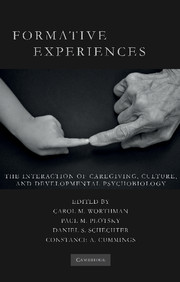
-
Select format
-
- Publisher:
- Cambridge University Press
- Publication date:
- 26 May 2010
- 07 April 2010
- ISBN:
- 9780511711879
- 9780521895033
- 9781107635180
- Dimensions:
- (228 x 152 mm)
- Weight & Pages:
- 0.97kg, 624 Pages
- Dimensions:
- (229 x 152 mm)
- Weight & Pages:
- 0.9kg, 622 Pages
You may already have access via personal or institutional login
Book description
The authors offer a unique exploration of the formative effects of children's early life experiences, with an emphasis on interactions among neurodevelopmental, behavioural and cultural dynamics. Multidisciplinary case studies focus on specific periods of development, or windows of susceptibility, during which care giving and other cultural practices potentially have a long-lasting impact on brain and behaviour. Chapters describe in detail: how social experience interacts with neurodevelopmental disorders; how epigenetic mechanisms mediate the effects of early environment; the interaction of temperament and environmental influences; the implications of early life stress or trauma for mental health and well-being; and the cultural shaping of sexual development and gender identity. The final section translates insights from this work into a fresh appraisal of child-rearing practices, clinical interventions and global public health policy that affect the mental health and well-being of children around the world.
Reviews
“A wonderful book for all professionals whose work touches the lives of children and their caregivers, and others in allied fields!”
– T. Berry Brazelton, Brazelton Touchpoints Center and Harvard Medical School
“A rich and highly diverse collection of papers that illuminate some of the complex puzzles lying at the interface of development, experience, and biology. Scholars interested in the new evidence on epigenetic processes, Williams syndrome, and cultural influences should profit from this volume.”
– Jerome Kagan, Harvard University
“Formative Experiences is a marvelous collection on the frontier of knowledge about the role of the environment in social and emotional development. Its range of contributions – from the developmental psychobiology laboratory to the exotic cross-cultural field study and the clinical challenges of psychological suffering – make it unique, and the distinction of its authors make it indispensable. It sets a new standard for multilevel analysis in this rich and exciting realm of science.”
– Melvin Konner, author of The Evolution of Childhood: Relationships, Emotion, Mind
"Interdisciplinary cross-cultural research on the formative impact of experiences in childhood, including bullying and other stresses."
–Chronicle of Higher Education
"...The multidisciplinary approach encourages a transactional view of developmental plasticity and variation and includes both animal and ethnographic studies. Excellent commentaries follow many of the chapters and provide undergraduates with excellent models of critiques and discussions... Highly recommended..."
--J. Mercer, emerita, Richard Stockton College, CHOICE
"....Formative Experiences is a must-have for scholars interested in the biology of child development in cross-cultural context. It does a remarkable job of capturing the key points of what must have been a fascinating conference.... Formative Experiences would be an excellent catalyst for an interdisciplinary seminar on child development.... provide a broad playing field for graduate students in anthropology, developmental psychology, human biology, genetics, medicine, neurobiology, and related disciplines....."
--Mark V. Flinn, University of Missouri, American Journal of Human Biology
Contents
Metrics
Altmetric attention score
Full text views
Full text views help Loading metrics...
Loading metrics...
* Views captured on Cambridge Core between #date#. This data will be updated every 24 hours.
Usage data cannot currently be displayed.
Accessibility standard: Unknown
Why this information is here
This section outlines the accessibility features of this content - including support for screen readers, full keyboard navigation and high-contrast display options. This may not be relevant for you.
Accessibility Information
Accessibility compliance for the PDF of this book is currently unknown and may be updated in the future.


